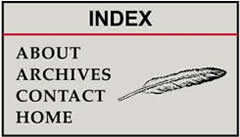MAY
15, 2005 --
There
are, I think, several forms of commencement talks. One form is
the commencement address as state paper. The best known of this
form are, perhaps,
Secretary of State George C. Marshall's speech at Harvard on June 5, 1947,
calling for the reconstruction of post World War II Europe, and President Kennedy's
address at American University, June 10, 1963, announcing suspension of U.S.
nuclear testing in the atmosphere, and calling for a comprehensive test ban
treaty.
This type of talk uses the commencement setting to address an audience at some
distance from the speaker's podium.
Another form of commencement speech is written for those sitting in front of
the speaker, perhaps sweltering in caps and gowns under a bright sun. These
remarks belong to the latter category.
But before continuing in the latter context, I would note that President Kennedy
began his American University speech by saying that he would be getting a degree
from American University in about half an hour while Bob Byrd got his law degree
from the University after years of night school.
And 42 years later Senator Byrd remains a Senate fixture, as is evident from
current discussions on the floor of the United States Senate about making some
changes in the filibuster rule.
Now to some remarks intended primarily for the graduates. You have successfully
completed four years of academic study, and are about to commence what some
might call your life in the real world -- including, I would quickly add those
of you who will go on to graduate study.
It is my sense that post-graduate study offers a glimpse of reality no less
stark than direct entry into the private sector.
After many years spent in the real world, I have concluded that many locations
in such space are beyond imagination on Conmmencement Day -- I doubt that many
in President Kennedy's audience expected that in four decades we would we communicating
by cell phones and
listening to iPods, and taking greenbacks out of ATMs.
Perhaps more would have expected that the 21st century would bring individual
means of flying transport, even an end to traffic gridlock.
|
|
Yet,
for all the presently unimaginable gifts technology is to bring,
the starting point is a good grasp -- and acceptance -- of the
basics.
With
this in mind, I would offer the following suggestion as guide
throughout your post-commencement journey. Try not to lose your
keys. Ever.
From this it should follow that you will not lose your glasses, your cell phone,
your TV remote -- or whatever object your remote will operate.
That is to say, let knowing the placement of your keys open the door to organization,
focus, productivity.
There
is a price to be paid for disorganization, lack of focus -- time.
Spend
only five minutes a day looking for an object that would be found
immediately by means of organization and discipline and you have
lost a day a year. After three decades, that is a month of productivity
that is lost to the individual and, indeed, to the community.
I
have gone on, here, perhaps, at length far greater than necessary.
Walt Disney, I think, had this as his motto -- "Be yourself."
My hunch is that just being one's self might not be sufficient to commencing
a life in the direction of a sense of well-being, Perhaps it is, after all,
the Boy Scouts who, using no no more words than did Mr. Disney, offered counsel
somewhat wiser: "Be prepared." And then, of course, just go out and "carpe
diem" -- in the common good.
One further thought. I expect that many, indeed perhaps all, of you intend
to "make a difference" as you go about seizing the days.
I would ask that you aim, instead, to making a contribution, the implications
of making a difference allowing for something other than a beneficial result.
Some years ago, before taking my bar exam, as I recall, I asked a very wise,
retired high school math teacher to wish me luck.
He said that as he expects I prepared for the exam, luck has nothing to do
with it, and then added, with emphasis on the final word -- "I wish you
well."
And so, Class of 2005: I wish you well.
|
|




